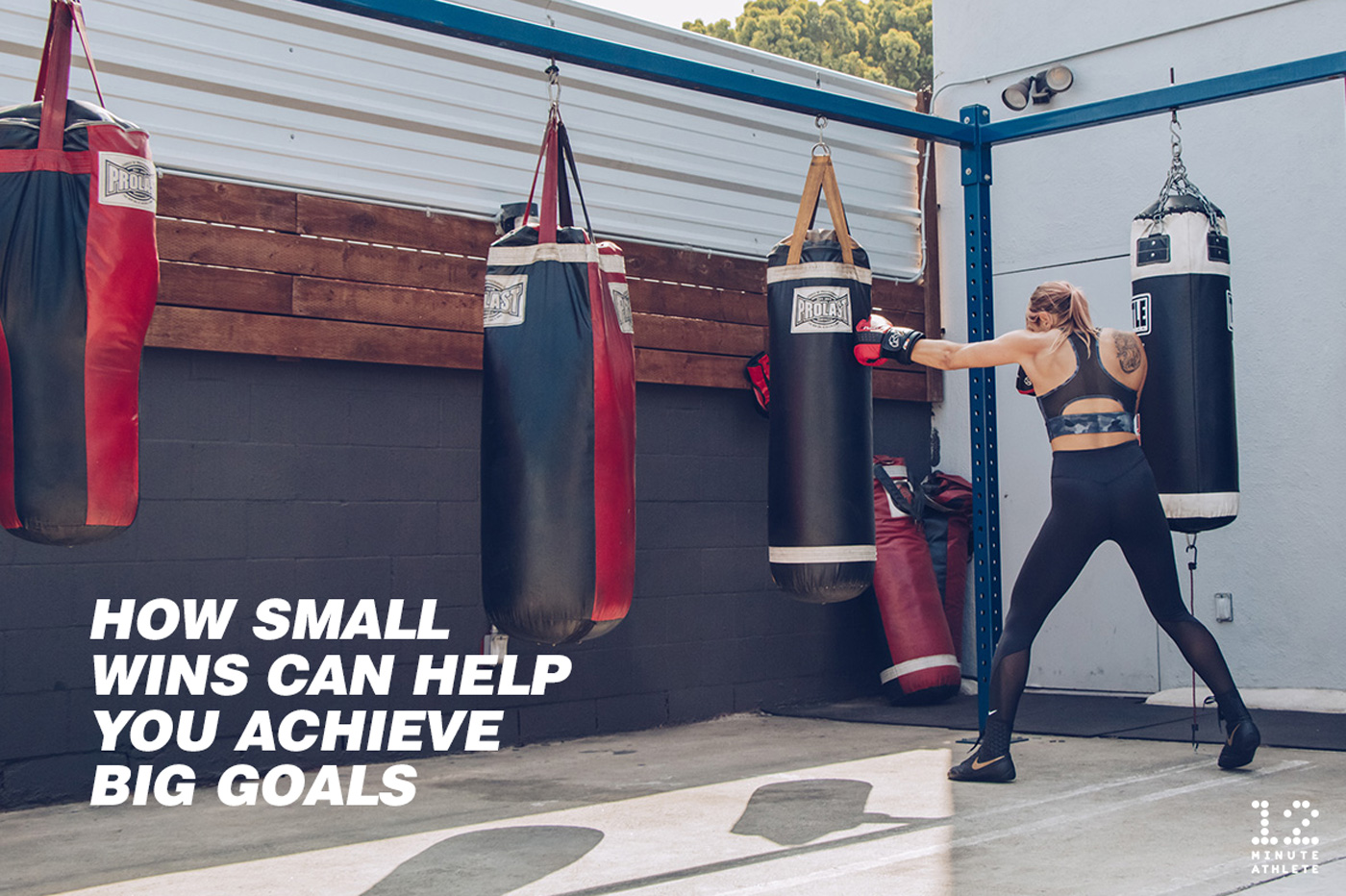“The problem human beings face is not that we aim too high and fail, but that we aim too low and succeed.” – Michelangelo
Setting big, audacious goals is important if you want to work toward fulfilling your potential in both fitness and life. But the reality check of setting such big goals can be demoralizing once you realize just how much work you have ahead of you.
That initial excitement you get from dreaming big is often followed by a feeling of overwhelm, prompting questions of self-doubt like, “How can I possibly go for a goal this big?” And, “Where do I even start?”
This is where learning to recognize small wins can motivate you to keep going, even when you have months (or years) of work ahead of you to get where you want to go.
Small wins are essentially progress points on the way to your larger goal. They remind your brain that no matter how futile your efforts may seem at times, you are making progress.
These small wins can act as a checklist en route to your bigger goals. Because while they may seem small in the moment, if you achieve enough over time they’ll add up to big results.
Here’s how to harness the power of small wins to achieve any fitness (or non-fitness) related goal.
Start With a High, Hard Goal
High, hard, ambitious goals motivate us to take action to begin with. When you decide you want to learn to do a handstand, take up surfing, or write a book, you initially get a surge of excitement and motivation.
That motivation can fade when you realize just how big and overwhelming that goal really is. Depending on where you’re starting from and how far you have to go, your new reality might mean you have months, if not years, of hard work ahead of you.
This is where many people get discouraged and give up before they even give themselves a chance to make significant progress. They let the immensity of their goal overwhelm them and decide it’s pointless to keep trying, and as a result, they end up giving up way too soon.
I see this happen over and over again with strength, skill, and weight loss goals. People start full of enthusiasm, ready to crush their goals, but by week two, much of this initial motivation has already been depleted. By week three, most people have already quit.
If you focus too much on your high, hard goal, you’ll feel like you’ll never get there. But you do have to set a goal to get started.
Chunk Down Your Big Goals
After getting clear on your long-term goal, the next step of any goal-setting process should be to chunk down your high, hard goals. This requires breaking them down into smaller, more manageable steps, or mini-goals that you can take action toward on a daily, weekly, and monthly basis.
Each mini goal you complete acts as a small win or a stepping stone on the path to your larger goal.
At this stage, every action counts. For example, if you have a long-term goal of doing a pull-up, investing in a pull-up bar for your house, or finding a nearby calisthenics park counts as an action taken. So does setting a training schedule and doing your first pull-up focused workout.
To capitalize on the power of small wins, you must keep track of your progress somewhere. You can use a paper notebook, a digital notebook, or even a habit tracking app.
The actual method you use to track your progress doesn’t matter – what matters is that you actually use it. Experiment and see what works for you.
Celebrate Your Wins
In his book, Tiny Habits, behavior scientist BJ Fogg, Ph.D., breaks down why it’s so important to celebrate your wins when you’re working toward a goal or trying to create a new habit. These celebrations harness the power of feeling good as the best way to develop habits and are an important piece of any long-term pursuit.
Some examples of small, daily celebrations could be:
- Pumping your fist in the air in a celebratory manner after you reach 10,000 steps
- Smiling at yourself in the mirror and saying, “Victory!” when you hit a new PR
- Texting a supportive friend or significant other about your flexibility progress
- Putting a checkmark on your calendar each time you do a workout
You may feel a little ridiculous celebrating after your wins and want to avoid this step—don’t. As silly as it may feel at the time, adding celebration to your wins will make the entire process of working toward a goal more positive and help you stay motivated even when you struggle.
No matter how big your goal, always remember that slow progress is still progress. Keep chipping away at your goals, and before long, you’ll have made so much progress you’ll have to make even bigger goals.
Always keep in mind that no matter how slow your progress, the only way to truly fail is to give up altogether.
The post How Small Wins Can Help You Achieve Big Goals appeared first on 12 Minute Athlete.
from Blog – 12 Minute Athlete https://ift.tt/2CCGo1K



0 comments